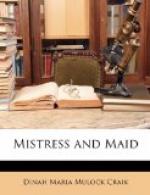CHAPTER XVI.
Next morning, while with that cheerful, unanxious countenance which those about an invalid must learn continually to wear, Elizabeth was trying to persuade her mistress not to rise, she heard a knock, and made some excuse for escaping. She well knew what it was and who had come.
There, in the parlor, sat Miss Hilary, Mrs. Jones talking at her rather than to her, for she hardly seemed to hear. But that she had heard every thing was clear enough. Her drawn white face, the tight clasp of her hands, showed that the ill tidings had struck her hard.
“Go away, Mrs. Jones,” cried Elizabeth, fiercely. “Miss Hilary will call when she wants you.”
And with an ingenious movement that just fell short of a push, somehow the woman was got on the other side of the parlor door, which Elizabeth immediately shut. Then Miss Hilary stretched her hands across the table and looked up piteously in her servant’s face.
Only a servant; only that poor servant to whom she could look for any comfort in this sore trouble, this bitter humiliation. There was no attempt at disguise or concealment between mistress and maid.
“Mrs. Jones has told me every thing, Elizabeth. How is my sister? She does not know?”
“No; and I think she is a good deal better this morning. She has been very bad all week; only she would not let me send for you. She is really getting well now; I’m sure of that!”
“Thank God!” And then Miss Hilary began to weep.
Elizabeth also was thankful, even for those tears, for she had been perplexed by the hard, dry-eyed look of misery, deeper than anything she could comprehend, or than the circumstances seemed to warrant.
It was deeper. The misery was not only Ascott’s arrest; many a lad has got into debt and got out again—the first taste of the law proving a warning to him for life; but it was this ominous “beginning of the end.” The fatal end—which seemed to overhang like a hereditary cloud, to taint as with hereditary disease, the Leaf family.
Another bitterness (and who shall blame it, for when love is really love, have not the lovers a right to be one another’s first thought?)—what would Robert Lyon say? To his honest Scotch nature poverty was nothing; honor every thing. She knew his horror of debt was even equal to her own. This, and her belief in his freedom from all false pride, had sustained her against many doubts lest he might think the less of her because of her present position—might feel ashamed could he see her sitting at her ledger in that high desk, or even occasionally serving in the shop.
Many a time things she would have passed over lightly on her own account she had felt on his; felt how they would annoy and vex him. The exquisitely natural thought which Tennyson has put into poetry—
“If
I am dear to some one else,
Then
I should be to myself more dear”—




